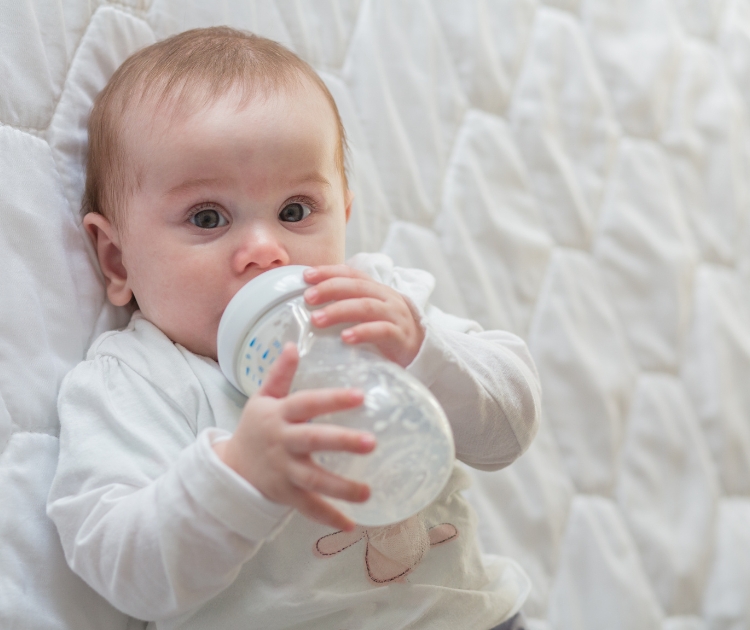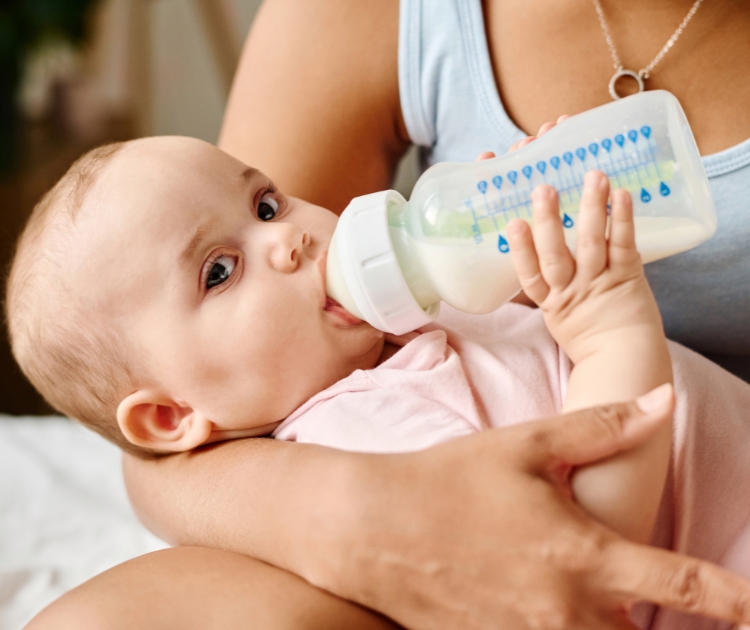Should you wake baby to feed? Quick test & advice

Waking a baby to feed: special cases and recommendations
You're probably wondering if you should wake your baby to eat? Between the fear that he's not eating enough and the desire to preserve his fragile sleep, new parents oscillate between anxiety and guilt. This article explains why, in most cases, letting your child sleep is not only possible, but beneficial for his development, especially for his brain maturation and well-being. Find clear advice as well as a quick test to know whether or not you should worry and wake your baby to feed him.
Should you wake baby to eat? The clear answer for parents
As a new parent, your baby's sleep is precious, but their feeding is just as important. A question then haunts you, especially in the middle of the night: should you wake the baby to eat? The fear that they're not gaining enough weight clashes with the desire not to disturb their hard-won rest. Rest assured, you're not alone in asking this question.
The general answer is simple: no, in most cases, it's not necessary to wake a sleeping baby to feed them. However, important exceptions exist and depend on their age, health, and growth curve.
This guide is here to help you see clearly and make the best decision for your child, with peace of mind.

3 key criteria to know if you should wake your baby (or not)
To decide, three decisive factors guide the decision: the baby's age, their weight curve, and particular medical circumstances. Let's review them to dispel doubts.
The age of the infant: 0-6 weeks ≠ after 2 months
Newborns, especially during the first weeks, have frequent needs due to their small stomachs.
Before 6 weeks, a full-term baby feeds on average every 2 to 3 hours. However, if their weight gain is good, they can sleep longer.
From 2 months, a rhythm naturally establishes, with periods of 3 to 4 hours between meals.
The weight curve and 24-hour intake
The growth curve, based on WHO references, is a reliable indicator.
A baby who follows a normal curve and wets 6 to 8 diapers a day generally doesn't need to be woken.
In case of weight loss greater than 10% or stagnation, medical monitoring is essential.
Specific cases: premature, GERD, complicated breastfeeding
Some babies require increased vigilance. For example, a premature baby may need more frequent meals to gain weight.
My premature daughter never woke up to nurse: what the pediatrician advised me — in this case, gentle and regular waking, combined with medical monitoring, is necessary.
Babies suffering from gastroesophageal reflux (GERD) or difficult breastfeeding should also be prioritized for support.
What happens if we don't wake them? Pro-sleep decoding

Deep sleep for babies is not a luxury, but a necessity. It stimulates growth, strengthens the immune system, and promotes emotional regulation. Interrupting this process risks disrupting the secretion of hormones like prolactin, essential for lactation. The stress induced by repeated awakenings can also affect future sleep, with repercussions on the child's mental health.
The link between sleep and brain development is crucial: deep cycles allow for the consolidation of learning and neuron maturation. Letting baby sleep, in normal cases, respects their biological rhythm and prepares for quality sleep in the long term.
For more advice, check out our article on helping baby fall asleep easily, such as soothing rituals or optimizing the sleep environment.
Signals to know: when to (really) worry?
A baby sleeping deeply is not necessarily a problem. The essential thing is to observe their overall behavior and reactions.
A lethargic or limp baby
If your infant seems limp and low-energy even when awake, this may indicate muscular hypotonia. A healthy baby responds to stimulation and moves. A floppy posture, like a rag doll, requires a consultation.
Fewer than 5 to 6 wet diapers per day
Before 6 months, a baby should wet 6 to 8 diapers a day. Fewer than 5 in 24 hours or dark urine are warning signs. Dry mouth or absent tears strengthen the suspicion of dehydration.
Incomplete feedings and weight loss greater than 10%
Frequently interrupted feedings or a loss of more than 10% of birth weight without rapid recovery require a consultation. Medical monitoring will allow evaluation of growth.
- Does your baby seem abnormally sleepy and difficult to stimulate?
- Is he pale or his complexion unusual?
- Does he cry in a weak and plaintive manner?
- Have you counted fewer than 5 wet diapers today?
If you answer yes to any of these questions, a consultation is necessary. Vigilance in the first weeks prevents complications.
Breastfeeding, bottle-feeding, mixed feeding: understanding different rhythms
? For breastfeeding: follow baby's demand
Breast milk is digested in 1 to 1.5 hours. Breastfed babies often wake up, which worries some parents. However, this is normal. On-demand breastfeeding remains essential: baby regulates their own needs, whether nutritional or comforting. Skin-to-skin contact and frequent feedings stimulate milk production and strengthen the mother-child bond.


? For bottle-feeding: avoid the worst mistakes
A bottle is digested in about 3 hours. Some babies sleep longer, but don't force a fixed rhythm. A timed bottle disrupts their rhythm. It's not a miracle solution for nights, but a well-fed baby regulates themselves. A bottle given too close together can even cause reflux or digestive issues.
? For mixed feeding: take precautions
The breast and bottle can cause nipple-breast confusion. Avoid bottles before 4 weeks, prefer the breastfeeding cup if necessary. If in doubt, adjust feedings on demand to compensate for a bottle feeding. Premature introduction of the bottle can reduce the duration of breastfeeding, as the baby favors the faster flow.
? The real indicators to follow
Regardless of the feeding method, two criteria count: regular weight gain (25-30g/day) and 6 to 8 wet diapers daily. These signals show that baby is well-fed. Unnecessary waking disrupts development. The pediatrician remains your reference in case of doubt.
The interactive quick test "To wake or not?"
Answer these 5 questions to assess your situation:
- Is the baby less than 6 weeks old?
- Has he lost more than 10% of his birth weight?
- Is he premature or underweight?
- Does he wet less than 6 diapers a day?
- Does he refuse feedings or seem limp?
If you answered "yes" to several of these questions, consult your doctor. Otherwise, let baby sleep peacefully.
What to remember (and repeat to grandma)
A baby who sleeps and grows well doesn't need to be woken up. The doctor is your compass, not past habits. Sleep and feeding naturally regulate themselves in a healthy child. If in doubt, a consultation provides answers tailored to your situation.
Medical opinions remain the compass. If in doubt, it is crucial to consult a healthcare professional, who will assess the situation based on the child's age, health status, and growth curve.
To avoid getting lost in this maze of information, some parents even seek to create a perfect environment, particularly around the baby's room. However, the mistakes to avoid when setting up the baby's room remind us that a balance between safety and simplicity is the best solution.













 What Age for Bunk Bed: Standards and Safety
What Age for Bunk Bed: Standards and Safety
 When to put baby in their room: age and transition
When to put baby in their room: age and transition
 Best Choice for Baby: Bed Attached to Parents or Next to Them?
Best Choice for Baby: Bed Attached to Parents or Next to Them?
 The convertible bed: furniture that grows with your child
The convertible bed: furniture that grows with your child
 The bunk bed with storage and desk: discover its advantages!
The bunk bed with storage and desk: discover its advantages!